Spanish Curse Words 🤬 Common Slurs and FREE QUIZ
Need-to-Know Spanish Curse Words – Heat Up Your Conversations and Swear Like a Native
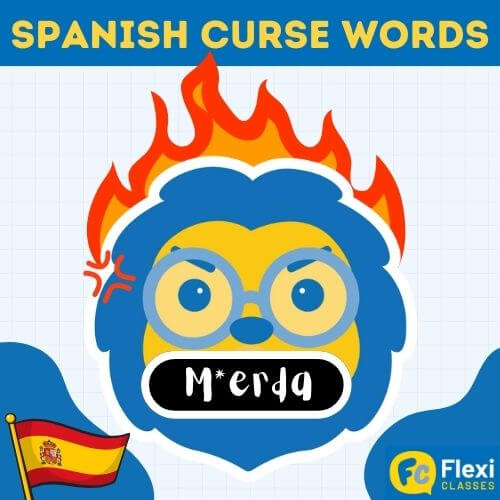
🧐 Let’s begin with the expected disclaimer, as curse words do tend to stir up strong reactions.
So, if that’s you, you’ve been warned about the possible sensitive content past these lines.
Coming right up, curse words or insults in español (European Spanish, otherwise commonly referred to as castellano ) and as the name indicates, which are proper to Spain and therefore frequently used in Spain.
Obvious, right ❓
Well not really, as some of the same curse words or insults are used in different Spanish speaking countries but with diverse connotations, contexts of use or and phrasal construction.
💡 So, with all that in mind, let’s begin the cursing session.
Spaniards really do use a lot of curse words, so much so that many times the words are devoid of their actual meaning and become mere interjections or ways of conveying emotions or reactions.
Master Spanish Swear Words:
Learn the Context, Use with Care!
Spanish Curse Words || Tacos Are Not Tacos
Spanish Curse Words || Curse Words 101
Spanish Curse Words || Top 10 Insults in Spain
Spanish Curse Words || Quiz
Spanish Curse Words || FAQs
Spanish Curse Words || Tacos Are Not Tacos
🤬 In Spanish, ‘to curse’ is often referred to as soltar tacos .
Soltar is ‘to let loose’ and tacos, in the general sense of the word, refers to a thick and short piece of wood (or other materials) that can fit into or fill in a gap.
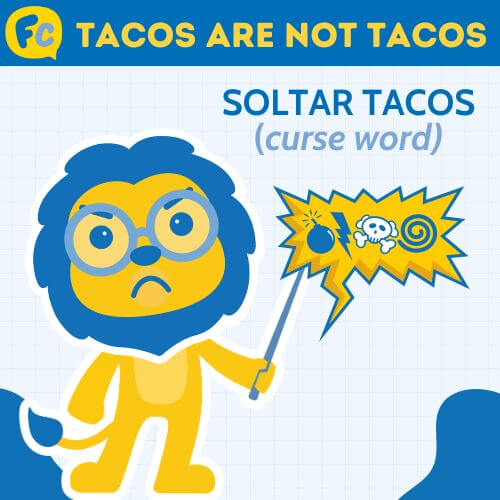
👇 So, soltar tacos, although literally translates to ‘let loose of small wooden blocks’, has evolved to mean ‘to curse’.
In this context, tacos have become synonyms for the terms ‘profanity’ or ‘swear word’.
Know then that when you hear the phrase soltar tacos or decir tacos , in Spain this references the act of cursing, rather than anything food related to Mexican tacos.
Other synonyms of curse words in Spanish are:
| Spanish | ENglish |
|---|---|
| palabrota | swear word |
| blasfemia | blasphemy |
| juramento | oath (can imply swearing) |
| reniego | renunciation/curse |
| maldición | curse |

Have a Good Day in Spanish 👋 How to Part Ways
Everyday Parting Phrases in Spanish – The Best Ways to Say Goodbye Let’s get these farewell ducks in order so you can express yourself correctly and comfortably. In general, most ways of saying farewell in Spanish are practically interchangeable, good…
Spanish Curse Words || Curse Words 101
You’ve probably reached this conclusion on your own and that is that the Spanish curse a lot, often and profusely, to the point where many times the actual profanity loses its actual meaning.
😎 TOP TIP – You might notice how in Spain, oftentimes, curse words have just become expletives, as a way to reinforce or emphasize what is being said or even to try and keep things casual or humorful or all of the above.
💡 So, in that light, here is your basic lexicon for cursing in Spain, with both the English literal translation of the word and the actual meaning(s) of the swear word:
Mierda
Mierda literally means excrement and translates to the English curse word ‘shit’.
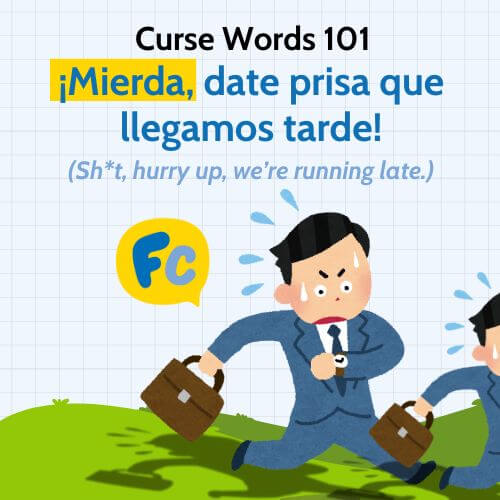
This swear word is so frequently used in Spanish that it can practically be thrown into any context.
Forgot your keys, tripped while running to the subway, or running late?
Mierda can be your go-to curse word, like in the example:
¡Mierda, date prisa que llegamos tarde! (Sh*t, hurry up, we’re running late.)
Cagar
A frequently used variation of mierda is the actual act of ‘taking a sh*t’, cagar.
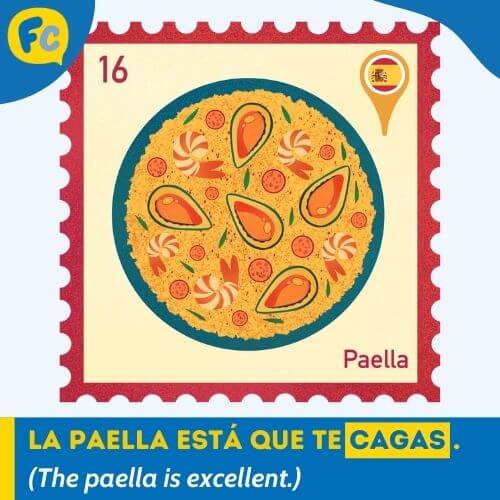
This curse word can either have a positive connotation or a negative one, depending on the context of use, like in the examples below.
In reference to something that kicks-ass or is excellent:
La paella está que te cagas.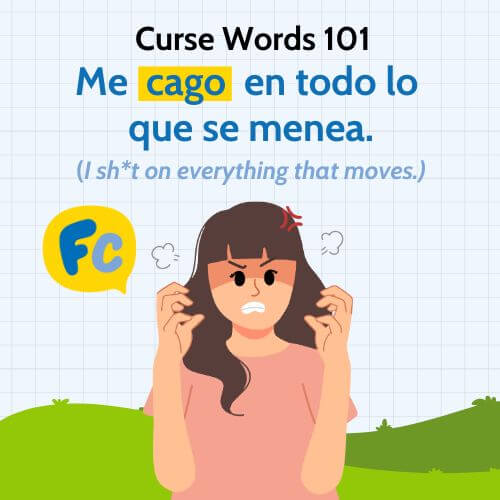
In reference to screwing things up or making a mistake:
La cagaste en clase con la respuesta. (You screwed up in class with the answer.)
As a curse:
Me cago en todo lo que se menea. (literally, ‘I sh*t on everything that moves.’)
Joder
Joder is slang for intercourse and translates to the English swear word ‘f*ck’.
The context of use for joder is so ample in Spanish, that its use practically equates to the milder English curse ‘sh*t’, although it can be used in a positive light as well.
Dropped your phone, stubbed your toe, frustrated after an argument or just want to make a point?
Joder can be your expletive of choice, like in the example below:
Joder, se me ha caído el móvil y ahora tengo que comprarme uno nuevo.English: F*ck, I dropped my cellphone and now I have to buy myself a new one.

Won a game, passed an exam, just got your first paycheck and a celebration is in order?
You can express that moment of joy with the expletive joder, like in the example.
¡Joder, qué bueno que soy, he aprobado todos los exámenes!
English: F*ck, I’m awesome, I passed all my exams!
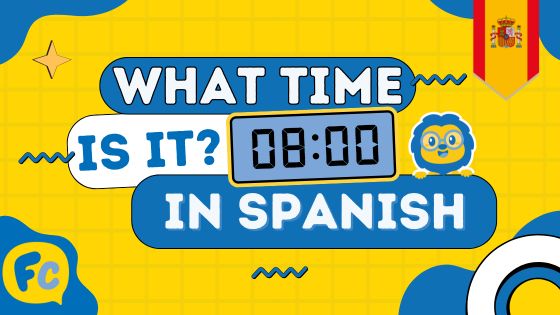
All There Is To Know About Asking What Time Is It in Spanish
⏰ What Time Is It in SpanishTelling Time Is Twofold in Spanish 💭 Granted that nowadays with almost every breathing creature (human) carrying a smartphone, we can easily check the time of day without having to ask for it. Still,…
Cabrón / Cabrona
Cabrón/a, literally translates to a ‘male goat’ and equates to the English
insult ‘asshole’ or ‘jerk’.
In Spanish, the interpretation of this cuss word will depend mainly on the context, as it can be used both as an insult or as a playful tease word, nudge or recognition between friends, like in the different examples below:
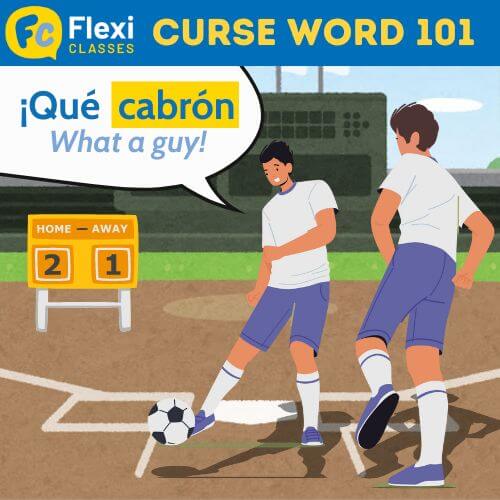
| Spanish | English |
|---|---|
| Este tío es un cabrón, vendería hasta su madre. | This guy is an asshole, he would sell his own mother. |
| Venga cabrona, dime si te gusta ese chico. | Come on girl, tell me if you like that guy. |
| ¡Qué cabrón, ha metido dos goles! | What a guy, he scored two goals! |
Gilipollas
Gilipollas, dates back to XVII to the court of the Spanish king, Felipe III, to refer to someone that is not very bright and, to this date, has conserved that meaning, in reference to a stupid person, an idiot or a dumbass.
Gilipollas is very frequently used and very much equates in use to the prior insult, cabrón/a, with the difference that gilipollas is more commonly used by a younger demographic and cabrón/a is more recurrent with the adult population.
Hostia
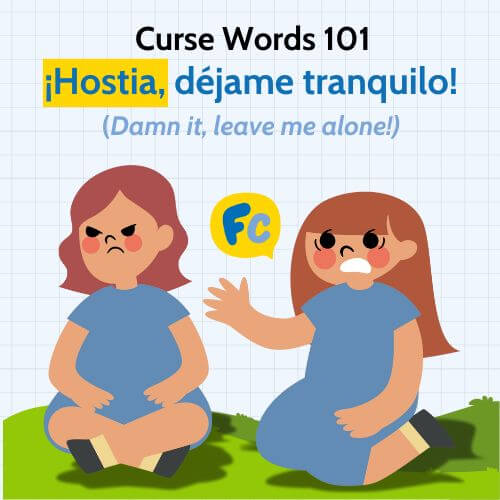
Hostia literally translates to ‘host,’ as in the holy communion wafer.
It is used to express a wide range of emotions or reactions, from surprise and pain to admiration or disgust, and can function as an interjection and, of course, as profanity.
💡 So, its meaning can really vary depending on the context of use, ranging from sheer profanity to just a plain interjection, very much like, wow, oops, oh no… etc., as in the examples below:
| Spanish | English |
|---|---|
| ¡Hostia, qué susto me has pegado, no te había visto! | Holy shit, you scared me, I did not see you! |
| ¡Hostia, me alegro que te haya salido bien! | Wow, I’m glad that it worked out for you! |
| ¡Hostia, déjame tranquilo! | Damn it, leave me alone! |
Coño

Coño, is slang for vagina and in English would translate to ‘pussy’. However, when used in Spanish, it does not really relate to the body part.
Instead, coño is more often used in a similar fashion to hostia, without the possible element of profanity.
Its use is versatile and expresses a wide range of emotions or acts as a mere interjection, some examples:
| Spanish | English |
|---|---|
| ¡Coño, qué daño! | Damn it, that hurts! |
| Coño, no encuentro el móvil. | Sh*t, I cannot find my cellphone. |
| ¡Coño, felicidades por el compromiso! | Wow, congratulations on the engagement! |
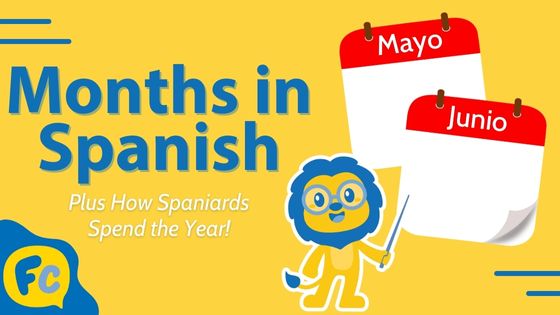
Months in Spanish 📆 || Key Vocabulary and Cultural Insights
Learn How to Say the Months in Spanish and Find Out How Spaniards Spend the Year No matter if you’re talking about birthdays, business trips or holiday plans, months are essential vocabulary you need to know in Spanish. So in…
Cojones
Cojones, literally means testicles and is slang for ‘balls’.
🧐This is probably one the most versatile Spanish curse words as it can be used to depict and express an indescribable amount of situations, emotions and reactions to name a few:
un cojón , used to express that something is costly or requires effort, for example:
Me costó un cojón.English: It cost me a fortune.
dos cojones , used to express bravery, example:
Él tiene dos cojones.English: He’s got guts.
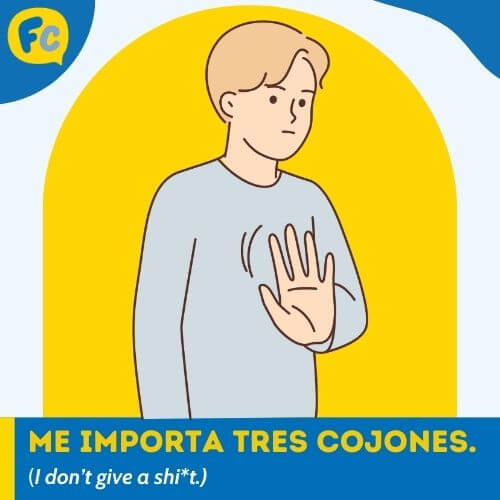
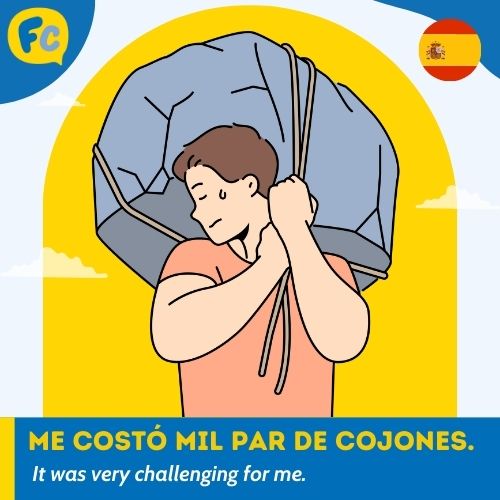
tres cojones , used to express disdain, example:
Me importa tres cojones.English: I don’t give a shi*t.
mil par de cojones , used to express difficulty, for example:
Me costó mil par de cojones.English: It was very challenging for me.
¡Tiene cojones! , (literally, it has balls), can be used to express frustration or anger.
Te corto los cojones.English: I will cut your balls. (can be used as a threat)
frío de cojones , to indicate that it’s freezing, example:
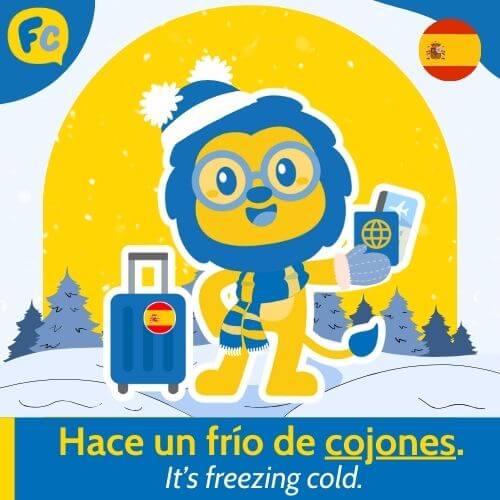

Hace un frío de cojones.English: It’s freezing cold.
de cojones , used to express success, example:
Me salió de cojones.English: I nailed it.
hasta los cojones , used to express you’re running out of patience, example:
Estoy hasta los cojones.English: I’ve had it up to here.
con cojones , (with balls), used to refer to someone brave.
sin cojones , (no balls), used to refer to someone who is a coward.
manda cojones , (equivalent to saying ‘it’s unbelievable’ or ‘what the hell’) used to indicate perplexity or disbelief.
me sale de los cojones , (equivalent to ‘because I say so’ or ‘because I feel like it’) used to express will or determination.

A Handy Tool – the Best Free Spanish Learning App
Get Some Extra Learning Mileage With The Best Free Spanish Learning App Disclaimer: Opinions expressed in this article are based on personal experience of use of the app as well as on supporting extensive research and comparative data online done…
And the list goes on and on… you get the gist!
Hijo de puta / Hija de puta
Hijo de puta/hija de puta (and variations), is the English equivalent of ‘son of a bitch’. Here are a few ways to phrase this curse word:
| spanish | Meaning |
|---|---|
| hijoputa/hijaputa | son of a b*tch |
| puto/puta | b*stard/b*tch |
Puta madre
Puta madre , equivalent to ‘motherf*cker’, although it can be used as well to express satisfaction or excellence, like in the examples below:
Está de puta madre el restaurante. (equivalent to saying ‘The restaurant is awesome.’).
Ella me cae de puta madre. (equivalent to saying, ‘I really like her’ or ‘I really get along with her’.)
Spanish Curse Words || Top 10 Insults in Spain
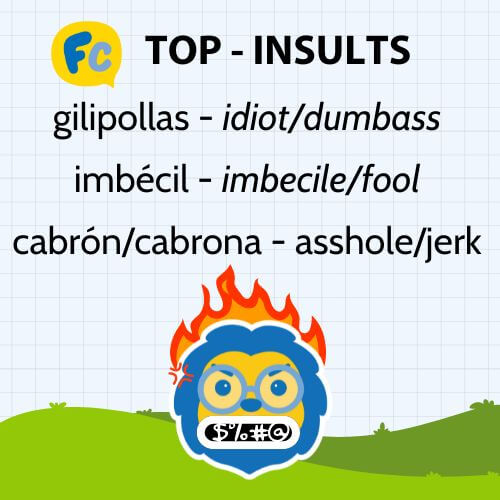
🤬 Using curse words is such a phenomenon in Spain that the linguistic departments of two universities (Universidad de Nebrija and Universidad de Alicante) conducted a study on the most commonly used insults in Spain.
Holding the TOP 3️⃣ positions are:
gilipollas (idiot/dumbass)
[ spak imbécil] (imbecile/fool)
cabrón / cabrona (asshole/jerk).
And completing the rest of the list are:
| spanish Curse words | english meaning |
|---|---|
| subnormal | someone who is mentally deficient |
| hijoputa/hijaputa | son of a bitch |
| tonto/tonta | fool or silly |
| idiota | idiot |
| puto/puta | bastard/bitch |
| capullo/capulla | prick or idiot |
| payaso/payasa | clown or fool |
⚡Are you learning Chinese or Japanese as well and would like to expand your vocabulary and learn some more naughty words?
We also have great guides for Chinese swear words, Italian swear words, Japanese swear words, Russian swear words and even Vietnamese curse words too!

Have a Good Day in Spanish 👋 How to Part Ways
Everyday Parting Phrases in Spanish – The Best Ways to Say Goodbye Let’s get these farewell ducks in order so you can express yourself correctly and comfortably. In general, most ways of saying farewell in Spanish are practically interchangeable, good…
Spanish Curse Words || Quiz
How well do you know your Spanish swear words?
Whether you knew some (or all) of them before reading this article, or on the contrary just learnt a bunch of them, take our quick fire quiz to see how well you remember them.
Share your results in the comments, and good luck!
Spanish Curse Words || FAQs
What is the f* word in Spanish slang?
The f* word in Spanish slang is joder, which is slang for intercourse, although the frequency of use of this word is such that it often loses its intended meaning.
Also, this curse word is frequently used as well as an interjection and can come across as a milder curse word equivalent to ‘shit’ and the likes.
See some examples of use in different contexts and situations:
¡Joder, qué suerte tienes! (Damn, you’re so lucky!)
Joder, necesito descansar. (Shit, I need to rest up.)
What are the most popular insults in Spanish?
According to a study jointly conducted by the linguistics departments of two Spanish Universities, Universidad de Nebrija and Universidad de Alicante, these are the top ten most widely used insults across the national territory:
gilipollas (stupid/idiot)
imbécil (imbecile/fool)
cabrón/cabrona (asshole/jerk)
subnormal (someone who is mentally deficient)
hijoputa/hijaputa (son of a bitch)
tonto/tonta (fool or silly)
idiota (idiot)
puto/puta (bastard/bitch)
capullo/capulla (prick or idiot)
payaso/payasa (clown or fool)
What is the Spanish word for curse?
In Spanish, ‘to curse’ is commonly referred to as soltar tacos, which literally translates to ‘let loose of small wooden blocks’.
The word tacos initially referenced these thick and short pieces of wood (or other materials) used to fit or fill in a gap but evolved to mean ‘curse word’.
So in the context of curse words, the term tacos has become a synonym to ‘profanity’ or ‘swear word’ and is therefore completely unrelated to the Mexican food staple, tacos.
Other synonyms of the term ‘curse words’ in Spanish are:
palabrota (swear word)
blasfemia (blasphemy)
juramento (oath, which can imply swearing)
reniego (renunciation/curse)
maldición (curse)
What are alternatives to swearing in Spanish?
Commonly used alternatives to curse words in Spanish at times are just variations or like-sounding words to the actual slurs. In case you want to substitute your expletives with non-cussing Spanish words, here are some examples.
Note that many of them can come across as random words that do not make much sense, basically acting as euphemisms (a better way to say something nasty):
caracoles (snails)
leñe (a variation of leña, which literally means firewood)
ostras (oysters), a euphemism for the curse word hostia.
miércoles (used instead of mierda, which translates to ‘shit’)
Me importa un pepino (literally ‘I don’t give a cucumber, used instead of Me importa una mierda, ‘I don’t give a shit’)
caramba (wow or goodness)
rayos (blast it)
gilipuertas (instead of gilipollas, which is equivalent to ‘dumbass’ or ‘idiot’)
cielos (literally, skies)
¡qué rabia! (expressing frustration or anger and akin to saying ‘how annoying’.)
What are some common Spanish curse words?
Here are some commonly used swear words you will surely hear when in Spain:
Mierda, literally means excrement and translates to the English curse word ‘shit’.
A frequently used variation of mierda is the actual act of taking a shit, cagar.
Joder, is slang for intercourse and translates to the English swear word ‘fuck’.
Cabrón/cabrona, literally translates to a ‘male goat’ and equates to the English insult ‘asshole’ or ‘jerk’.
Gilipollas, refers to a stupid person, an idiot or a dumbass.
Hostia, literally translates to the ‘host’, as in the holy communion wafer, and is used to express a wide range of emotions or reactions, from surprise, pain or admiration to disgust or even as an interjection.
Coño, is slang for vagina and in English would translate to ‘pussy’.
Cojones, literally means testicles and is slang for ‘balls’.
Hijo de puta/hija de puta (and variations), would be the English equivalent of ‘son of a bitch’. Here are a few ways to phrase this cuss word:
Hijoputa/hijaputa (an abbreviated version)
Puto/puta (bastard/bitch)
Puta madre, equivalent to ‘motherfucker’, although it can be used in a positive light as well, like for example to express satisfaction or excellence.
Want More From LTL?
FANCY LEARNING SPANISH? Check out our online Spanish courses here.
We offer a 7-day free trial to all online students where you can study Spanish 24/7. It doesn’t end there either.
We teach over 10 of the world’s most popular languages 😎
Come and be a part of our amazing community.









